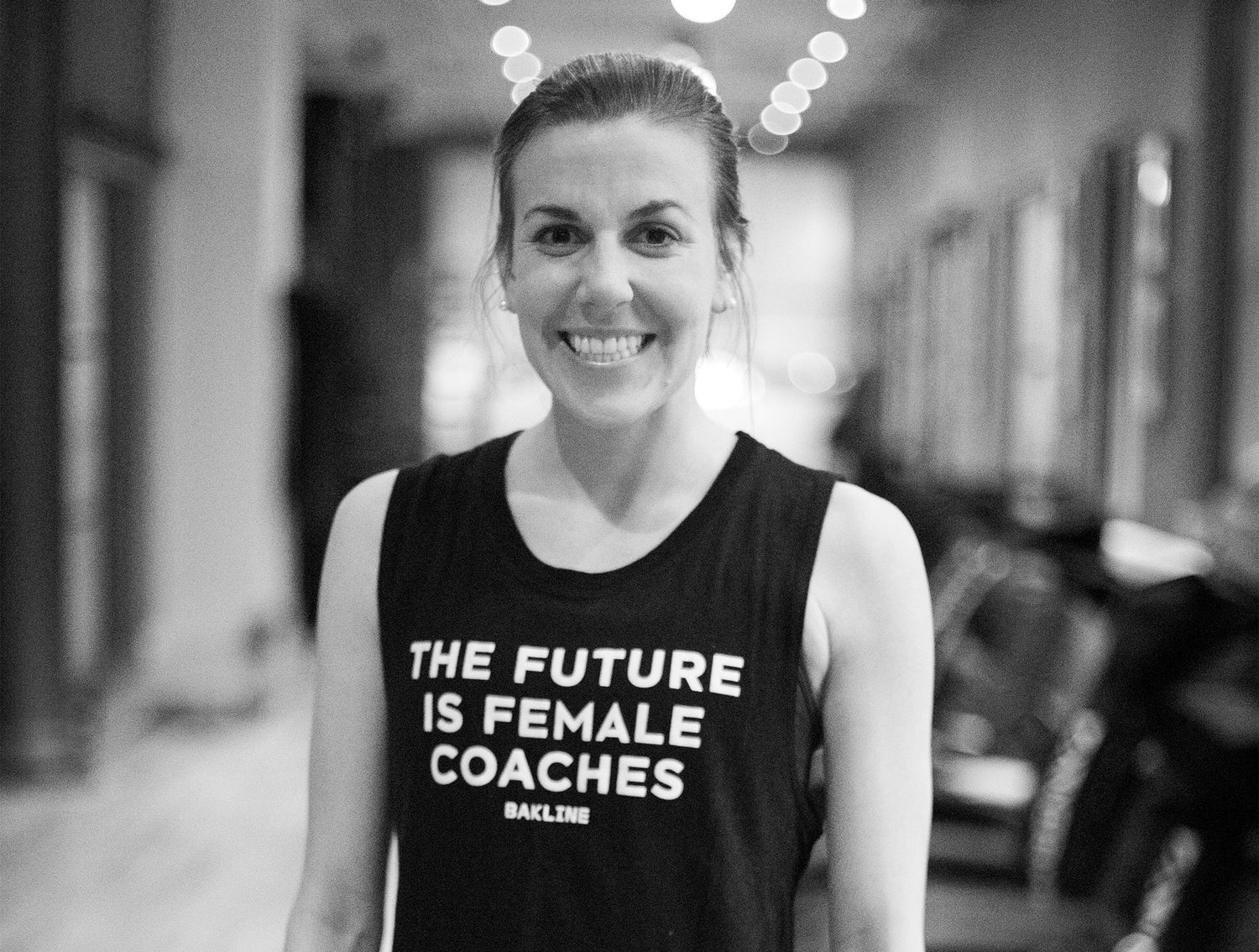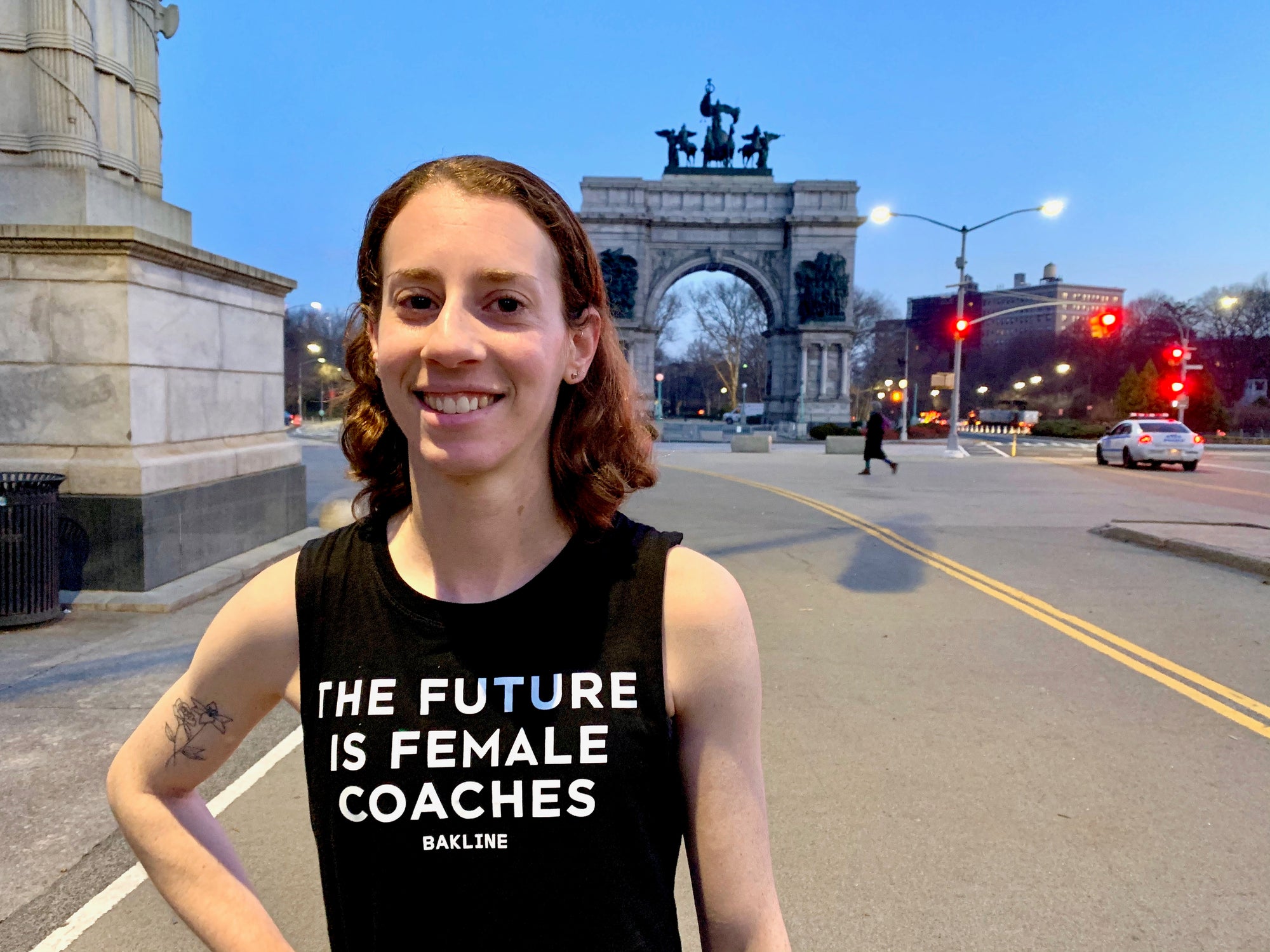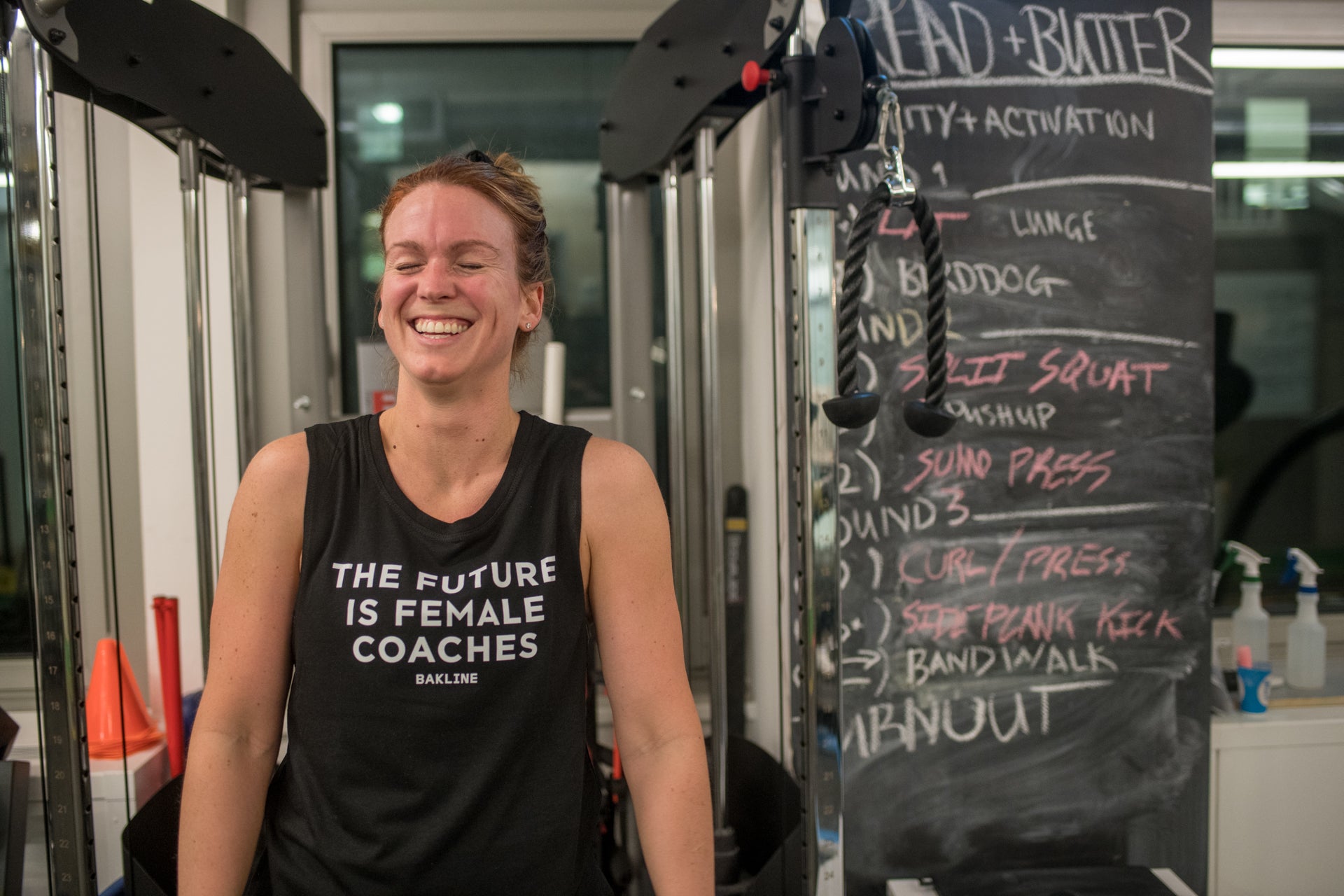In The Future is Female Coaches series, we’re celebrating the women of our sport who are leading, inspiring, and making us all stronger. Every week we’ll be featuring interviews with female coaches about their experiences and insights working across a variety of aspects and disciplines within the running space. We want to get the perspective of women working with youth sports and adult clubs, to highlight coaches training recreational and competitive runners, and hear stories from tracks, roads, and trails.
This week we’ve interviewed Dr. Emmi Aguillard, who brings a unique perspective on the sport drawn from her years as a runner, coach, and physical therapist. Emmi is a former D1 athlete who currently runs and coaches with the NYC Dashing Whippets and practices at Finish Line Physical Therapy. Follow Emmi on Instagram at @emmiaguillard_pt, @dashingwhippets, and @finishlinept.

Athletic History & Experience: I started running track in 6th grade and was instantly hooked. I stuck with it through high school and went on to compete at the Division I level at Tulane University, racing the 1500m for track and captaining the cross country team my senior year. In 2013 I moved to NYC to attend physical therapy school at Columbia University, and joined the Dashing Whippets Running Team. Since then, I’ve been competing in a lot of NYRR races including the Club Points Series, the NYC Marathon, and I’ve also raced the Boston Marathon (3x).
Current Athletic/Running Interests: Currently I work full time as a physical therapist specializing in runners and endurance athletes at Finish Line Physical Therapy here in NYC! My running goals are: breaking 5 min mile and 1:20 half marathon. I’m taking a break from marathons!
Coaching Role: I am a coach for the Dashing Whippets Running team, where I help to create training plans for the marathon and half marathon and strength training programs for the team. Additionally, I work with individuals to create personal training plans geared towards their specific races and goals. I have background as both a pacer for the Nike+NYC running club and an assistant high school cross country coach.
How did you get your start in the sport? How have your involvement and interests changed over time?
I was a very energetic child who tried multiple sports but was graced with terrible hand-eye coordination. In 6th grade, my middle school friend group signed up for the track and field team and I went along. I started out running the 200m and finishing close to last in a lot of races, so our coach suggested that I try running with the distance gang. I remember how the 800m seemed incredibly long. But, one thing led to another and the next summer I was signed up for a summer cross country camp. I started to see how in this sport, hard work could make up for talent, and I was hooked!
I guess it was around junior year of high school when I started winning small track meets and made it to our state meet that I started thinking about the possibility of running in college. I also had a tumultuous experience with high school coaches and a team full of incredibly talented sprinters who had absolutely no interest in any distance over 400m. I was eager to see what I’d be capable of surrounded by other runners who actually enjoyed the longer races.
Running in college was a grounding force in my life, keeping me balanced. Most importantly, I made some of the best friendships of my life after going through what at the time felt like hell and back as we juggled academics, athletics, night-life in New Orleans, and everything in between. At the time, I thought I was at my absolute peak from a performance perspective and it would all be downhill after graduation, but I’ve been pleasantly surprised that this is not true!
In my head, I also had a goal of running the Boston Marathon and breaking 3 hours - I think every runner dreams of doing this one day. Moving to New York and being surrounded by so many marathoners, my training slowly transitioned to the half and then to full marathon distance. I’ve checked both of those boxes, and now my personal goals are back to what I love most - mile, 5k, halves.
In the last few years, I’ve really grown to love the coaching aspect of running! I’ve always known that this would be a part of my involvement in the sport. While currently I am very passionate about both coaching and my own training, I know that there will be a time when I am fully vested in coaching. It is incredibly rewarding to watch your athletes succeed - to watch them learn how to execute, how to fight, and how to achieve and surpass their own goals and expectations. I absolutely love it. I love being able to use my own love of the sport to spark that fire in others.

What has kept you engaged over the years?
Oh man. So many things - where to start? A funny little story is the brief amount of time that I took a hiatus from it. I’d always been a mostly straight-A student, but when I moved up to NYC and started school at Columbia, I was done with collegiate running and feeling pretty burnt out. I decided that running was just not for me right now and I needed to focus on school. Then, I failed my first two tests of PT school - I’d never failed a test before in my life! That’s when I joined the Whippets, and I made an A+ on my next anatomy test. Aside from a few minor injuries, I’ve stayed running consistently ever since.
A huge part of it for me is the social aspect. I’ve made most of my best friends in life through running, and find runners to just be such an amazing group of people - down to earth, friendly, welcoming, goofy, adventurous, and always ready to grab a beer. It’s a great way to find a community when moving to a new city. I just love all aspects of the sport and of running in general - racing, easy runs with friends, meditational solo runs, coaching, rehabbing injured runners, teaching.
Did you have any female coaches in your athletic history? Did that change your experience in any way?
My experience with coaches in my athletic history is a huge part of what has inspired me to become involved in coaching. Actually - I never really did have any female coaches except for an assistant coach in middle school.
What inspired you to start coaching?
A big part of what inspired me to start coaching is seeing the differences that bad and good coaches can make. I was lucky - I had the most incredible middle school cross country coach and a really positive experience with the sport at a young age that really stuck with me. My high school experience was quite the opposite. My high school had an incredible sprint program (we were Louisiana 5A state champions my senior year!) but I was our only distance runner, and cross country was loathed by the rest of the team. I craved a program with other distance runners which is why I wanted so badly to compete in college. When Tulane University recruited me, there was a female head coach and assistant distance coach, but they left right before school started. We did eventually get a coach halfway through my freshman year cross country season. But he struggled to put together a cohesive team in swampy New Orleans, where everyone was more interested in booze than mileage. I never forgot Coach Mark from middle school, and I know that I never would be where I am today if it wasn’t for those early, positive experiences with cross country and track.
While I’m currently working mostly with adults here in NYC, I would love to one day coach at the middle or high school level. Coaching is about so much more than running and competition, and I think having strong coaches at this level can really shape the lives of these young athletes and give them the discipline, courage, and work ethic to succeed in so many areas of life - academically, professionally, and with personal relationships. I love the “running as a metaphor for life” attitude. There are so many values that this sport teaches kids and young adults.
What athletes, distances, and events do you coach?
Currently I mostly work with recreational runners, plus a few sub-elites and triathletes. Events range from the mile to the marathon.

Photo credit: @zhetrick
What is your coaching philosophy?
For the types of runners that I currently work with, individualized training plans are key. Every BODY is different, and what works for your friend is not necessarily what’s best for you. I think especially with the hustle and bustle of NYC life, it’s important to develop a plan that fits with everything else in your life, and not revolve your life around running. That is key for sustainability (unless you are a professional runner). As a physical therapist working with so many injured runners, I am hyper-focused on keeping my runners healthy.
What’s the most important thing you’ve learned in your experience as a coach that you wish you’d known as an athlete?
The most important thing is start slow to finish fast. I could NEVER manage to do this as a young athlete and definitely paid the price by repeatedly falling short of my goals. Finally in my older age it’s clicked. I drill into my athletes’ heads the importance of making your last reps your fastest. It’s impossible to execute a smart race on race day if you don’t practice smart race strategy in practice!
You are also engaged in the sport in your professional work as a physical therapist. Are there aspects of injury prevention or athlete wellness that you find are of particular importance to women?
Bone health. I see this so much more in women than in men – in part because our bone health is so closely linked to our estrogen levels. As females, our hormone levels are constantly fluctuating, and influenced by so many factors including nutrition, birth control, menopause, etc. And this needs to be said: NOT GETTING YOUR PERIOD IS NOT NORMAL. IT IS NOT A SIGN OF PEAK FITNESS and can have devastating effects on your future as a runner.

Team culture can be an incredibly positive influence for athletes and their athletic development, but can also become a vehicle to reinforce negative patterns and behaviors. You’ve been involved in running throughout your life as a high school, collegiate, and club athlete, and have experienced a variety of teams and coaching systems. What can coaches and athletes do to foster a healthy and supportive team culture?
I think it’s so important to appreciate the value of every runner – from the fastest to the slowest. As a coach, it can be easy to really focus on your stars, but this is dangerous for team morale. A strong and successful team is not composed of one or two all-stars, but of a strong pack that is in sync; this is what I love so much about the sport of cross country as compared to track and field. If you are that star on your team – be like Shalane Flanagan and Des Linden. Pull others up there with you. Most importantly – form bonds of friendship with your teammates! As a coach, communicating appreciation of your athletes is key. It’s so important to let your athletes know that you care, that you are personally vested in how they do. I think a strong support system is everything.
Whether we’re talking about high school and collegiate athletes or adult runners focused on a seasonal goal, success in the sport is generally measured in short-term performance gains. As a coach and a practitioner, how do you think about supporting long-term athlete development and longevity in the sport? How can we address it as part of the wider competitive culture?
I have a talk with a lot of my athletes about the culture surrounding marathons. Far too often, I see beginner runners sign up for a marathon, and before I know it, they have 3 on the books for the next year. It’s so important to slow down and take a step back - from the running culture of New York City, from what you see your friends doing on social media. A beginner runner should master the basics before attempting the extremes of the sport. Most professional marathoners have been running for ~15 years, but don’t start marathons until they are in their 30s. Why? It takes time to work towards this. I so strongly encourage my athletes to circle back to the mile and 5k, to work on efficiency and running economy, before attempting the longer distances.
Completely switching gears, much more research needs to be done on the topic of coaching women. Coaching young women athletes effectively puts collegiate coaches in a tough position. We are starting to understand that many female athletes are not biologically designed to peak in their late teens to early 20's - the time in which they are competing collegiately. In fact, because of the way females’ bodies develop, it’s actually fairly common to put on more weight during these years, and then become a bit naturally leaner in our later 20's. As a collegiate coach focused on making your athlete the strongest, toughest competitor she can be, on winning a divisional or conference championship and bringing a program to the top - how do you deal with this? How do you handle the frustration of athletes who are struggling to best their high school PR's, who don’t care at all about their long term potential as a runner, or even health? I think education is KEY, but I don’t know what the full answer is.
What areas of the sport have most evolved or improved for women in the time you’ve been involved?
Women are being pushed harder. I remember my first years of running cross country, the girls and the boys still raced different distances - 2 miles for the girls and 3 for the guys. Now we race the same distances. I think this is wonderful. But I think we are also starting to see how the pendulum is starting to swing too far because at the end of the day, women are not small men. We deserve to be treated as equals to men, but we can also be treated differently. I think it is so VERY important to understand the female body and its development and how a program should be adjusted to better cater to females. It’s complicated! We need to better understand the way that the menstrual cycle affects training, nutrition, and recovery. We need to pay close attention to female bone health. The list goes on!
What’s the most important area of growth or change you’d like to see for the future of female running?
More female coaches - 100% !!!


